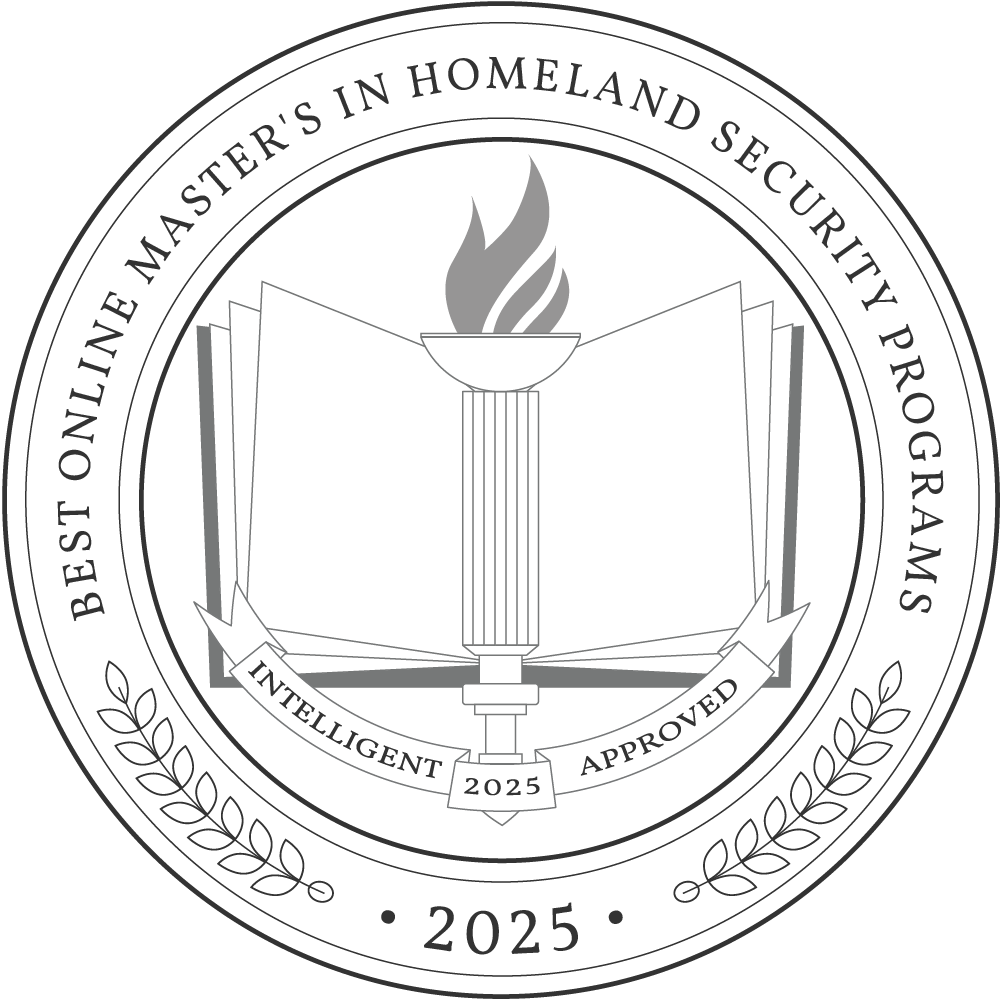The U.S. Department of Homeland Security employs more than a quarter of a million individuals working across various specialty areas, including border security, emergency response, counterterrorism, chemical facility inspection, and cybersecurity. An online master’s in homeland security prepares students for a leadership position within the field.
According to the Bureau of Labor Statistics (BLS), there are dozens of career paths under the homeland security umbrella, such as information or cybersecurity analyst, occupational health and safety specialist, and emergency management director.
Most online master’s programs in homeland security require between 30 to 40 credits; full-time attendees typically complete the coursework within two years, but some accelerated programs allow students to finish the program quicker. The average annual tuition for a graduate degree program is $20,513.
Why Trust Us
The Intelligent.com Higher Education Team is dedicated to providing students with independent, equitable school and program rankings and well-researched resources. Our expert-driven articles cover topics related to online colleges and programs, paying for school, and career outlooks. We use data from the U.S. Department of Education’s College Scorecard, the National Center for Education Statistics, and other reputable educational and professional organizations. Our academic advisory team reviews content and verifies accuracy throughout the year for the most current information. Partnerships do not influence rankings or editorial decisions.
- Analyzed over 2,000 national, accredited, and nonprofit colleges and universities
- 800+ rankings pages are reviewed and updated yearly
- Content is informed by reputable sources, surveys, and interviews with academic advisors and other experts
- Over 100 data points are reviewed for accuracy and quality throughout the year, including sources
How we rank schools
Our list features the best online Homeland Security degree programs at top colleges nationwide. Each school featured is a nonprofit, accredited institution — either public or private — with a high standard of academic quality for post-secondary institutions.
We evaluated each school’s program on tuition costs, admission, retention and graduation rates, faculty, reputation, and the student resources provided for online students. We collected data from trusted sources like the National Center for Education Statistics, individual school and program websites, school admissions counselors, and other data sources. Then, we calculated the Intelligent Score on a scale of 0 to 100 based on the following criterion:
Academic Quality:
- Admission rate versus enrollment rate
- Retention rate of students who return after year one
- Accreditation status (regional and programmatic)
- Nonprofit status, both private and public institutions
Graduation Rate
- Overall graduation rate
- Total number of currently enrolled students, including diversity metrics
- Student-to-faculty ratio
Cost and ROI
- In-state and out-of-state per-credit tuition rates and fees
- Required credits to graduate
- Earning potential after graduation
- Availability of federal student loans, scholarships, and other financial aid options
Student Resources
- Available student services for online-only and hybrid programs
- On-campus amenities like tutoring centers and the number of libraries
Read more about our ranking methodology.
Best 17 Accredited Online Master's in Homeland Security Programs
FiltersInstitution Type
Status
- Intelligent Score
- Alphabetically By University Name
- Acceptance Rate
- Enrollment
- In-state Graduate Tuition
- Out-of-state Graduate Tuition
- In-state Undergraduate Tuition
- Out-of-state Undergraduate Tuition

George Washington University
Intelligent Score: 97.70In-state: $55,961
Out-of-state: $55,961
In-state: $31,770
Out-of-state: $31,770
SAT: 1270-1450
ACT: 30-33
$1,375
Online
Middle States Commission on Higher Education
36

PennState World Campus
Intelligent Score: 95.60In-state: $15,025
Out-of-state: $24,413
In-state: $22,464
Out-of-state: $22,464
SAT: 1070-1300
ACT: 24-29
$1,027
Online
Middle States Commission on Higher Education
33

Mississippi College
Intelligent Score: 93.47In-state: $18,200
Out-of-state: $18,200
In-state: $11,610
Out-of-state: $11,610
SAT: 1140-1260
ACT: 21-29
$695
Online
Southern Association of Colleges and Schools Commission on Colleges
30-36

Tulane University School of Professional Advancement
Intelligent Score: 93.23In-state: $83,890
Out-of-state: $83,890
In-state: $50,674
Out-of-state: $50,674
SAT: 1370-1510
ACT: 31- 33
$1,210
Online
Southern Association of Colleges and Schools Commission on Colleges
33

Angelo State University
Intelligent Score: 92.49In-state: $4,412
Out-of-state: $14,228
In-state: $4,119
Out-of-state: $4,119
SAT: 920-1120
ACT: 17-23
Resident: $417
Non-Resident: $827
Online
Southern Association of Colleges and Schools Commission on Colleges
36

Towson University
Intelligent Score: 92.28In-state: $6,962
Out-of-state: $21,098
In-state: $7,902
Out-of-state: $7,902
SAT: 1040-1200
ACT: 20-25
$669
Online, Hybrid
Middle States Commission on Higher Education
36

Rosemont College
Intelligent Score: 91.85In-state: $19,500
Out-of-state: $19,500
In-state: $12,780
Out-of-state: $12,780
SAT: 910-1170
ACT: 16-26
$710
Online
Middle States Commission on Higher Education
36

Sam Houston State University
Intelligent Score: 90.43In-state: $5,856
Out-of-state: $15,672
In-state: $5,765
Out-of-state: $5,765
SAT: 970-1120
ACT: 18-23
$320
Online, On Campus
Southern Association of Colleges and Schools Commission on Colleges
36

Northwestern State University of Louisiana
Intelligent Score: 88.98In-state: $5,180
Out-of-state: $15,968
In-state: $5,738
Out-of-state: $5,738
SAT: 978-1130
ACT: 17-23
$475
Online
Southern Association of Colleges and Schools Commission on Colleges
30-36

New England College
Intelligent Score: 88.84In-state: $25,439
Out-of-state: $25,439
In-state: $15,624
Out-of-state: $15,624
SAT: N/A
ACT: N/A
$580
Online
New England Commission of Higher Education
36

Endicott College
Intelligent Score: 87.44In-state: $34,470
Out-of-state: $34,470
In-state: $12,666
Out-of-state: $12,666
SAT: N/A
ACT: N/A
$809
Online, On Campus
New England Commission of Higher Education
36

Auburn University at Montgomery
Intelligent Score: 87.09In-state: $10,080
Out-of-state: $30,240
In-state: $10,080
Out-of-state: $10,080
SAT: 1160-1320
ACT: 25-31
$465
Online
Southern Association of Colleges and Schools Commission on Colleges
30

Texas A&M University-Central Texas
Intelligent Score: 86.71In-state: $8,395
Out-of-state: $36,849
In-state: $6,775
Out-of-state: $6,775
SAT: 1160-1380
ACT: 26-32
Resident: $297
Non-Resident: $705
Online, On Campus
Southern Association of Colleges and Schools Commission on Colleges
36

Keiser University
Intelligent Score: 83.75In-state: $19,808
Out-of-state: $19,808
In-state: $27,162
Out-of-state: $27,162
SAT: N/A
ACT: N/A
$1,037
Online
Southern Association of Colleges and Schools Commission on Colleges
33

Liberty University
Intelligent Score: 83.61In-state: $14,791
Out-of-state: $14,791
In-state: $7,935
Out-of-state: $7,935
SAT: 1040-1250
ACT: 21-29
$565
Online
Southern Association of Colleges and Schools Commission on Colleges
30

Virginia Commonwealth University
Intelligent Score: 82.56In-state: $12,179
Out-of-state: $32,827
In-state: $12,703
Out-of-state: $12,703
SAT: 1060-1250
ACT: 21-28
In-State: $745
Out-of-State: $1,531
Online
Middle States Commission on Higher Education
36

Pace University
Intelligent Score: 81.44In-state: $45,832
Out-of-state: $45,832
In-state: $32,256
Out-of-state: $32,256
SAT: 1060-1240
ACT: 22-28
$860
Online
Middle States Commission on Higher Education
30
How To Choose an Online Master’s in Homeland Security Program
Choose your area of study
This degree may be available as a Master of Arts (MA), Master of Science (MS), Master of Professional Studies (MPS), or Master of Public Administration (MPA). Each type of degree has its own pedagogical approach, but all will prepare you for a career in homeland security.
The homeland security field is vast, with multiple specialty areas. While all programs feature similar core topics such as homeland security strategy, administration, and ethics, students should expect to choose a concentration. Typical concentration options include counterterrorism, cybersecurity, public health, and biosecurity. If you already know what you would like to do after you graduate, look for programs that closely match these career goals.
Research schools and programs
You should only apply to institutions that have been approved by a DOE-recognized regional accrediting organization, such as the New England Commission of Higher Education or Northwest Commission on Colleges and Universities. These organizations evaluate schools to ensure they provide students with a high-quality education. Those who attend a school that isn’t regionally accredited may be unable to access financial aid or transfer credits to another institution if needed.
In addition to accreditation, you should also consider the following factors:
- What is the online community like? Do students and faculty engage in virtual office hours? Will you study alongside a cohort? The online experience can vary dramatically, so be mindful of what you seek as a student.
- How does the program provide an opportunity for practical application? Most online master’s programs in homeland security require a capstone assignment, whether a project, an internship, or a practicum experience.
- What supplemental resources do online students have access to? Your tuition should cover more than the coursework itself. Online students often have access to mental health support, tutoring, free software and subscriptions, military student aid, disability services, and 24/7 tech support. Consider what you need to succeed in your studies.
To learn more about any schools that you’re interested in, you can visit the school’s website, contact an admissions counselor, follow the school on social media, or attend an in-person or virtual open house.
Prepare for tests and applications
Application requirements vary by school and program. Typically, online master’s in homeland security programs will require applicants to have an undergraduate degree from an accredited institution. Common accepted undergraduate areas of study include criminal justice, public administration, public health, social work, parks and recreation management, environmental science, and geography. Many master’s programs set a minimum undergraduate GPA.
In many cases, graduate homeland security programs require their candidates to show evidence of employment within the field. Students should expect to submit a professional resume along with their application materials. Most programs do not mandate GRE scores. International or ESL applicants will need to submit proof of English language proficiency.
Depending on the school, you may be expected to submit transcripts, letters of recommendation, and a personal statement. Always contact an admissions counselor to ensure you have the most accurate information regarding requirements and deadlines.
Select your program
Determine which options best fit your personal and professional goals based on each program’s concentration, online community, student support services, and cost. Some schools are more competitive than others, so you should apply to several programs to increase your chances of getting accepted.
Before making your final decision, review your needs and goals again. Do you plan to attend school full-time or part-time? Are you only interested in 100% online programs, or are you fine with a hybrid program that has a few in-person requirements? Some programs offer asynchronous courses, which can be completed at your own pace, while others only offer synchronous courses, which involve remotely attending lectures and completing assignments at the same time as other students — which of these two online learning formats do you prefer? Your school should accommodate your scheduling needs and learning preferences.
Determine how you’ll pay for your degree
No matter your situation, all students should complete the FAFSA to determine their federal aid or loan eligibility. Speak to your current employer. Some agencies offer tuition stipends or reimbursement to their employees. Discuss financial aid opportunities with the school’s admissions or financial aid office. These individuals can help you identify potential scholarships or other funding opportunities you qualify for. Military veterans may receive tuition assistance, so contact the school’s veteran’s affairs office.
What Can You Expect From an Online Master’s in Homeland Security Degree?
Students pursuing an online homeland security master’s degree will learn the fundamentals of homeland security, covering topics such as cybersecurity, ethics, administration, and counterterrorism. Individuals will need to select a specific concentration to focus their studies.
Most programs require a two-year commitment, and many students choose to continue working full-time while earning their degree. To graduate, students must complete a capstone assignment, likely through an internship, an independent research paper, or a hands-on project. Upon completing the program, students can qualify for advanced leadership positions within homeland security agencies at the federal, state, local, and international levels.
Potential courses you’ll take in an online master’s in homeland security program
- Terrorism and Weapons of Mass Destruction. Students will study the history and evolution of terrorism and modern-day preparedness and response strategies.
- Integrated Emergency Management. In this course, students learn about the theories behind emergency management and practical emergency response.
- Crisis Intervention. This class covers fundamental crisis intervention theories concerning disaster and emergency management situations. Students will study the role of law enforcement, emergency responders, and public health personnel during a crisis.
- Homeland Security Policies, Principles, Procedures, and Plans. This course analyzes the U.S. Department of Homeland Security’s history, politics, and legal framework. Students learn about national security tactics and resources.
What Can You Do With an Online Master’s in Homeland Security?
Career outlook
The strategic priorities of the U.S. Department of Homeland Security (DHS) provide a good overview of the different career paths available to those who have earned a master’s in homeland security — your options include counterterrorism, cybersecurity, border security, disaster preparedness, and emergency response.
In addition to DHS, other federal agencies (such as the Central Intelligence Agency and Federal Bureau of Investigation), state and local governments, and many private organizations also need homeland security experts.
To give you an even better sense of the possibilities in this industry, here are some of the most common occupations and job responsibilities for homeland security professionals:
- Police officer or detective — Patrol assigned areas, investigate crimes, and arrest suspects.
- Median annual salary: $74,910
- Projected employment growth (through 2032): 3%
- New job openings projected: 64,500 annually
- Emergency management director — Prepare plans and coordinate responses for emergencies and natural disasters.
- Median annual salary: $83,960
- Projected employment growth (through 2032): 3%
- New job openings projected: 900 annually
- Information security analyst — Monitor networks, identify vulnerabilities, train staff on how to prevent security breaches, and recommend security upgrades.
- Median annual salary: $120,360
- Projected employment growth (through 2032): 32%
- New job openings projected: 16,800 annually
Online Master’s in Homeland Security Degree Frequently Asked Questions
How do I apply to an online master's in homeland security degree program?
Each program’s website outlines its specific expectations for application materials, but most include:
- A completed application (with fee)
- Copies of your official transcripts
- A professional resume
- A personal statement
- Letters of recommendation
Many online master’s in homeland security programs set a minimum undergraduate GPA requirement. Some adhere to strict deadlines for sending application materials. Contact an admissions counselor with questions or concerns about your eligibility or application.
How much does an online master's in homeland security degree cost?
The average tuition for a graduate degree is $20,513 per year. Private schools tend to be more expensive than public schools, though public schools often charge out-of-state students a higher tuition rate than in-state students.
How long does it take to earn an online master's in homeland security degree?
Most homeland security master’s degree programs require 30 to 40 credit hours. Full-time attendees can finish the program within two years, though some accelerated options could shorten that commitment to 16 to 18 months. Sometimes, your professional or military experience could count toward credit, further condensing your time commitment. A part-time student taking two classes each semester would need closer to three years.
Is an online master’s in homeland security worth it?
While you only need a bachelor’s degree for most entry-level homeland security jobs, there are still a variety of benefits to earning a master’s.
A master’s degree will help you stand out from other candidates and get hired more quickly, especially when you’re just starting your homeland security career and don’t yet have much experience. Also, in general, a master’s degree leads to higher earnings — the Bureau of Labor Statistics reports that workers with a master’s degree earn an average salary of $1,737 per week, while those with only a bachelor’s degree earn $1,493 per week.
There are many benefits to earning your degree online rather than in-person as well. Online degree programs eliminate the need to commute to campus, allowing you to save a significant amount of time. Completing an online program also demonstrates to employers that you have the ability to manage your time and stay focused without direct supervision, which is especially important if you would like to work remotely.

